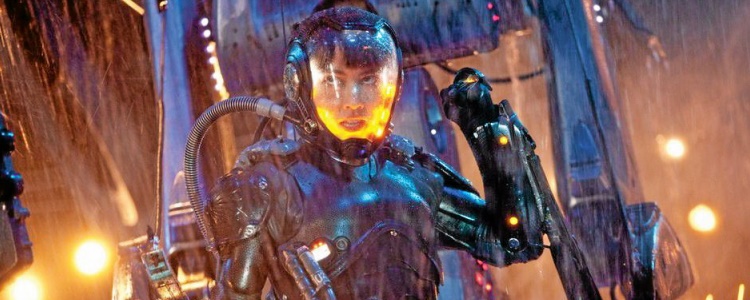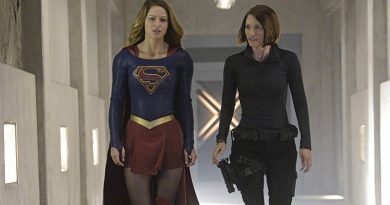Heroine’s Journey: Mako Mori in Pacific Rim
 Over at TheMarySue, Brooke Jaffe posted an essay discussing how Pacific Rim smashed action-movie gender tropes with the character Mako Mori. While Raleigh Beckett is the male lead, Jaffe points out that Mako “binds the rest of the characters in the story together” and that she is the one “who goes on a Campbellian heroic journey.”
Over at TheMarySue, Brooke Jaffe posted an essay discussing how Pacific Rim smashed action-movie gender tropes with the character Mako Mori. While Raleigh Beckett is the male lead, Jaffe points out that Mako “binds the rest of the characters in the story together” and that she is the one “who goes on a Campbellian heroic journey.”
In our Heroine’s Journey series here at FANgirl, B.J. Priester and I have been charting the differences likely to be seen in a heroic journey arc for a female character. One of the notable elements is that the journey will not be alone, as often found in the Campbellian model, but rather includes a team. Jaffe says of Mako’s journey:
Raleigh is her messenger, who calls Mako to action by encouraging her to pursue becoming a Jaeger pilot even against Marshall Stacker Pentecost’s (the ever-amazing Idris Elba) insistence. Her crossing of the threshold is her trial with “chasing the rabbit” on her test-run in the Jaeger– after that point she is Gipsy Danger’s pilot in truth, even despite the fraught circumstances of her first piloting attempt. Her test is the fight to protect Hong Kong from the dual-Kaiju attack, the final battle is the rift-closing mission, and her re-emergence into the world is through the escape pod. Raleigh may also have his own version of the monomyth narrative in play, but Mako is as much of a Campbellian hero as he is– which is often ignored and worth noting. Pacific Rim is both of their stories, happening in concert with one another.
Additionally, Jaffe discusses the movie’s lack of romantic plot, avoidance of catering to the male gaze, and the non-traditional family units. The whole article is worth the read, and like Jaffe I hope to see more movies of its kind.
Over at The Daily Dot, Aja Romano suggests a new Mako Mori test is a better alternative to the Bechdel test as a way “to change the conversation about what constitutes ‘strong women’ in film.” The term “strong female character” was a topic of discussion at the New Statesman this week as well, where Sophia MacDougall, who has advocated for better female characters, laments that the term even needs to be used. Specifically her concern is “that the majority of writers or readers are reading the term” strong to mean only physical strength, rather than other forms of toughness, much less the many other ways female characters can be well-written.
Popping over to the dictionary (courtesy of Microsoft Word’s Encarta feature), “strong” is flushed out by 25 different definitions. The ones that are particularly relevant: 1. physically powerful, 2. using force, 3. robust and sturdy, 4. emotionally resilient, 5. healthy and well, 6. thriving, 7. likely to succeed, 8. convincing, 9. knowledgeable, 10. exerting influence, 11. effective, 12. felt powerfully, 13. distinctive, and 14. extreme.
From my FANgirl post “What is Strong?”
I’ve addressed that previously, and I truly believe the meaning of strong that women are after is “effective” – a term that isn’t nearly as powerful as strong. Yes, it’s frustrating that the thousands of nuances that seem to be easily understood about effective male characters seem to be easier for storytellers to create, but we’re digging out of a hole of learned behavior. Men and women write certain tropes simply because that is what they were raised on, and they aren’t self-aware enough to counteract the momentum.
There are eminent flaws in the Bechdel Test, too. It creates a rigid one-dimensional framework for female characters the same way the Mary Sue Litmus Test does.
If we want all types of effective female characters, we cannot expect simple tests to define them. The process is more a calculus than simple algebraic math. Romano suggests the Mako Mori test be used in conjunction, but as a storyteller and woman I caution against being afraid of failing to create an effective female character simply because she fails one or the other standard.
The Mako Mori test is passed if the movie has: a) at least one female character; b) who gets her own narrative arc; c) that is not about supporting a man’s story. I think this is about as indicative of “feminism” (that is, minimally indicative, a pretty low bar) as the Bechdel test. It is a pretty basic test for the representation of women, as is the Bechdel test. It does not make a movie automatically feminist.
If you’re unclear about a female character, it’s worth asking others, especially informed women, their opinion. That’s why it’s still most important for fans to encourage the entertainment industry to bring more women into the storytelling process.
Tricia Barr took her understanding of brand management and marketing, mixed it with a love of genre storytelling, and added a dash of social media flare to create FANgirl Blog, where she discusses Star Wars, fandom, and strong female characters. She also writes about Star Wars for Random House’s science fiction and fantasy blog Suvudu.com and Star Wars Insider magazine and is a contributor for Her Universe’s Year of the Fangirl.
Tricia is putting the finishing touches on her first novel, Wynde – a military science fiction with a fantastical twist that features heroines Vespa Wynde and Gemini Reed. For excerpts and tales of her adventures in creating a fictional universe, hop over to TriciaBarr.com.
For updates on all things FANgirl follow @FANgirlcantina on Twitter or like FANgirl Zone on Facebook. At times she tries the Tumblr.
- Hyperspace Theories: Bad Luck Ghorman - June 2, 2025
- Hyperspace Theories: One Year Later as ANDOR Kicks Off Season Two - May 15, 2025
- REVIEW: Tales of the Underworld - May 4, 2025








